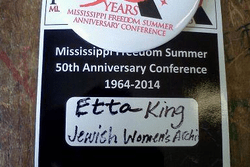Letters from Jackson: Day 2
JWA's Etta King is in Jackson, Mississippi this week to attend a conference commemorating the 50th anniversary of Freedom Summer. Following in the tradition of other Northerners who went South, she is writing me a letter each day to reflect on her experiences there. I hope you find them as educational and entertaining as I do. —Tara
Dear Tara,
You might be sorry to hear it, but I do not miss home yet. Southern hospitality is REAL and amazing. Just came back from an incredible evening of Southern food, music, visiting, and art at the Mississippi Museum of Art, which has an incredible installation of Civil Rights Photographs. I got to meet Doris Derby who you should definitely know about if you don't already.
I think today might best be a day told in quotes from a few key experiences. There is so much more happening than I can fit in these few words.
"Your name is Etta? What kind of name is that? Who are you?"
That is what former SNCC Chairman Chuck McDew asked me this morning when I walked into the first plenary session. I didn't know who he was either, so after I told him about myself, I asked. Turns out, he is also a Brandeis alum—one of two black students there along with Angela Davis (for the record, her Wikipedia article says there were three black students in her freshman class). Can you imagine? I don't know why I find it so amazing that I knew/know so few names of people who were leaders in the Movement, but I meet more of them every day.
"The Constitution does not say 'I the President' cuz there was none. It does not say 'We the congress' or 'the supreme court' because they didn't exist. It doesn't say 'we the citizens of the United States'—it says 'WE THE PEOPLE.'" That is what Bob Moses (then-co-director of the Council of Federated Organizations that ran the Freedom Summer Project) said to us after having us stand and repeat the preamble to the Constitution after him, line by line. He closed by saying: "It says we the people, so you are going to have to figure out what you are going to do." I got chills. After spending most of his time on the panel listening in silence, he just stood up and said this at the end. It was immediately clear how he built up the Mississippi Movement. Thank God for hashtags, because all I can say is #mikedrop.
"That's the problem with the periodization of the Civil Rights Movement. Thinking about the Movement as a continuum is a much more powerful way of thinking about it because it reminds us that the work is not done."
Author, historian, educator, and friend Debra Schultz brought up this idea in her gallery talk at the Mississippi Museum of Art and it kind of blew my mind. We spend so much time talking about the "golden years" of the Civil Rights Movement. I'm guilty of this myself: the timeline I use when I teach starts with Brown v. Board and ends with the beginning of Black Power. In actuality, the Civil Rights Movement began with the first slave uprisings in this country and lives on today in the struggles for photo enfranchisement, education equity, and disrupting the cradle to prison pipeline that incarcerates 1 in 3 black men in this country. When I think about the Civil Rights Movement as happening right now, it makes me, as Paula would say, "an udgy mess." I really feel as if I cannot sit still any longer.
"You come to Alabama and you learn about Civil Rights. You come to Mississippi and you learn about a world."
Oregonian lawyer and educator Ron Silver dropped this little nugget as we were discussing leading civil rights trips to the South for teens. It's so true. Movement history in Alabama, with the Montgomery Bus Boycott and the Selma to Montgomery March, has a more linear story. But the story of the struggle for civil rights here in Mississippi paints a picture of another time and place—another world—where people were killed for looking the wrong way, beaten for registering to vote, and bombed for teaching children to read. All the more reason to uncover as many pieces of this history as we can.
"I didn't know we were making history. I just knew we were moving it forward."
I walked into the gift shop at the art museum and saw a woman getting her picture taken next to a book—her book. Then her camera died. When I offered to take the picture with my camera and send it over to her she was grateful and it gave me a good excuse to ask what brought her here to Mississippi. Mary Lovelace O'Neal was born in Jackson, raised in Arkansas, and then returned to Jackson in her late teens before attending Howard University. She came back to Jackson in Freedom Summer to work in the Movement and be with her family. She ended up being a sort of "advance man" for the Mississippi Freedom Democratic party, making sure they had places to stay as they traveled north for the Democratic convention. She shared her story with me, both of us tired from telling and listening to so many others. "It's bittersweet." She also said of the reunion and conference we are attending. "It's great to reconnect with people, but I also didn't know how many of us had passed on."
These tidbits are a reminder to me that movements are made up of people, and people are shaped by moments, choices, and relationships. We don't always know what will happen because of what we do, so we must be vigilant, we must be intentional, and we must try hard to know and respect other people because we cannot go it alone.
Good night,
Etta






